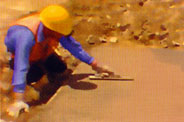|
Low temperatures slow concrete hydration. That is why an accelerator is needed to obtain high initial strength. Calcium Chloride.accelerates hydration and gives concrete the strength and durability to meet specification requirements at lower temperatures.
The American Concrete Institute Committee 306 has suggested procedures to achieve a quality product in adverse conditions. The use of calcium chloride assists in reaching the concrete's desired strength by accelerating the cement's hydration. Calcium Chloride is the most cost-effective accelerator for today's modern concrete.
Along with ACI recommendations, the latest reference information from the National Ready Mix Concrete Association and the Portland Cement Association concerning cold weather concrete construction is also recommended.
RECOMMENDED APPLICATIONS
Concrete advantages can be achieved when two per cent of calcium chloride is added to 100 pounds of cement, the rate recommended by the cement industry. But what is defined as two per cent? Two per cent defined as two pounds 77-80% flake material per 1 00 pounds of cement. Concentrations other than 77-80% need to be converted back to equivalent flake poundage. To find the correct dosage of various calcium chloride concentrations, use the tables supplied below.
|






 Calcium chloride
Calcium chloride
